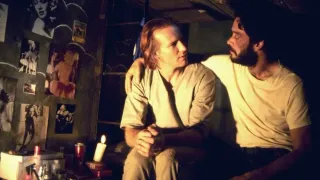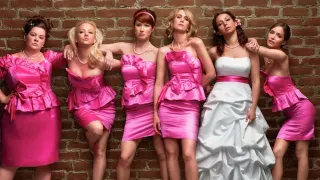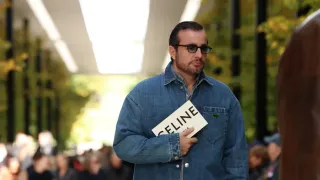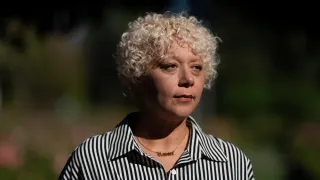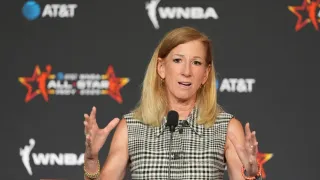November 14, 2014
Beyond Marriage: So Much More to Do
Kilian Melloy READ TIME: 5 MIN.
With a wave of recent victories, marriage equality throughout the United States seems inevitable but much more needs to be done in areas such as immigration, poverty, and global rights.
That was the message at a Tuesday, November 11 panel focused on the broad topic of the "State of the Movement" for LGBT people in California, nationally, and around the world.
The event was held by the Horizons Foundation, which gives grants to LGBT causes throughout the Bay Area, and the audience were philanthropists looking to learn about the movement that they fund.
More than 80 donors mingled in a break room at the offices of Merrill Lynch, which sponsors Horizons' philanthropy education series. Then they settled down to hear the panelists speak.
"January feels like it happened yesterday," began moderator Francisco Buchting, director of grantmaking and community initiatives at Horizons.
"Mother Russia losing its mind. Halfway through the year, the Uganda 'kill the gays' bill. Then, in the U.S., we saw the states fall like dominoes," Buchting said, referring to the clampdown on rights in Russia, new anti-gay efforts in Africa, and the rapid movement by states to legalize same-sex marriage in recent months.
Important legislation in California that was signed by Governor Jerry Brown included the outlawing of the "gay and transgender panic" defense in murder cases and a bill that removed barriers for transgender people to access identifying documents.
The dominoes haven't all fallen yet, but same-sex marriage is legal in 33 states, and more are likely to follow, although a 6th U.S. Circuit Court of Appeals decision last week that reversed six pro-marriage lower court rulings out of Kentucky, Michigan, Ohio, and Tennessee put a pause in the momentum.
Panelist Rick Zbur is executive director of Equality California, an organization that has largely focused on LGBT civil rights law including marriage.
Zbur said that next, Equality California will work to "address disparities in health and well being" for LGBT Californians. This could include health care, LGBT-inclusive sex ed, and housing rights - 40 percent of homeless youth are LGBT, Zbur noted. EQCA also plans to focus on these issues and more as they apply to undocumented LGBT people.
"One-third of LGBT immigrants in the U.S. are undocumented," Zbur said. "We want to educate our community about the need for comprehensive immigration reform."
Immigration is also a key focus for panelist Christine Sun, who leads the Immigrants' Rights Project at the American Civil Liberties Union of Northern California.
Looking out into the audience of mostly white male donors, Sun said the recent rate of progress is "truly stunning." Still, she said, much work remains.
"The central challenge for the LGBT movement is going to be how to better serve the members of our community that aren't in this room," Sun said.
That means tackling the wealth gap and discrimination based on race and immigration status, Sun said. Partly, that work could serve to protect the benefits of marriage won in recent years.
The LGBT movement can learn from the reproductive rights movement, Sun said. After Roe v. Wade, anti-abortion groups began to chip away at the right to choose. They first targeted poor women, working to ban Medicaid from covering abortions. Now, Sun said, these tactics have escalated to create an "existential threat" to abortion rights.
That's why focusing on the needs of the most marginalized in the LGBT community is in the self-interest of all LGBT people, Sun said.
"I recognize that it is in my self-interest, as a privileged lesbian living in San Francisco," she said.
Priorities
Panelist Jessica Stern also discussed the importance of making sure the LGBT movement prioritizes more than privileged San Franciscans. She is executive director of the International Gay and Lesbian Human Rights Campaign, and she said that LGBT rights as articulated in the U.S. cannot be simply exported to other countries. Instead, she said, people in the U.S. should work to build global solidarity guided by local efforts.
"The gay marriage agenda in the U.S. is assumed to be a priority around the world, even when that's not what people are articulating for themselves," Stern said.
There are unintended consequences to marriage equality gains in the U.S., Stern said. One example is the law signed by Nigerian president Goodluck Jonathan in January that banned same-sex marriage. Marriage equality was not a focus LGBT Nigerians, Stern said, but "under the specter of gay marriage" in the United States, Jonathan acted to further criminalize LGBT people in his country.
The panelists told many stories that demonstrated the complexity of seemingly straightforward LGBT victories. A tourist from sub-Saharan Africa who was quoted in the media as he partied at San Francisco pride is now seeking asylum after the interview made it back to his home country. EQCA volunteers in Palm Springs who spent hours searching for a pair of names on a petition after two teenagers who had signed it expressed fear that if the organization sent any follow-up materials to the addresses they had given, they could be disowned. Constance McMillen, Sun's client in Mississippi, a young woman who successfully fought her school board when it refused to let her take her girlfriend to prom in a case many saw as emblematic of a clear-cut U.S. cultural divide - in fact, Sun said, McMillen herself is an evangelical Christian.
Even as victories mount, the panelists agreed, much work remains to ensure a true, lived experience of equality for LGBT people.
Sun left the audience with two quotes to sum up the need for a broadly focused LGBT rights movement. In the words of Jane Addams, "the good we secure for ourselves is precarious and uncertain, is floating in mid-air, until it is secured for all of us and incorporated into our common life."
Or, in the immortal words of the cartoon Lilo & Stitch: "Family means no one gets left behind."
Horizons hopes to help secure rights for everyone, not just the most privileged, in part by channeling resources of wealthy LGBT people in the Bay Area to local organizations for the most marginalized within the community.
It also accepts corporate sponsorship and donations. This can lead to unlikely partners like Merrill Lynch, widely reported as one of the worst offenders in the subprime mortgage crisis of 2008 that left many LGBT people homeless - or the company that subsequently acquired it, Bank of America.
"We hosted the session on LGBT poverty and homelessness in the Bank of America building," said Deb Stallings, director of development at Horizons.
"It's important to engage everyone who has the means and the inclination to get involved in the fight," Stallings said.
And that fight has a long way to go, Stallings said. "We're not hanging the mission accomplished banner yet."
